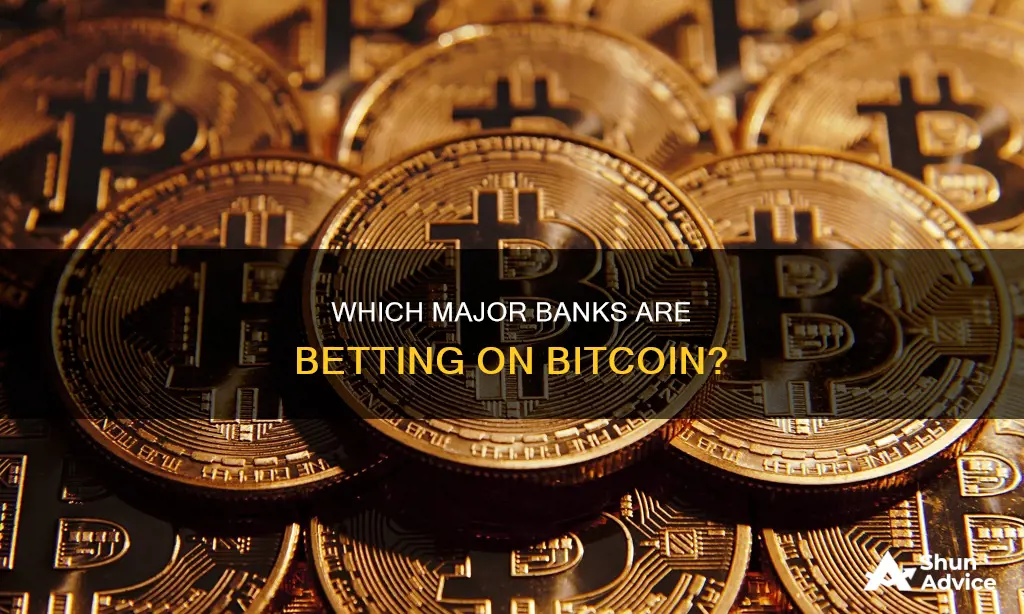
Bitcoin and other cryptocurrencies have influenced peer-to-peer money transfers by eliminating the need for intermediaries. In a fast-changing digital environment, banks are embracing cryptocurrency and blockchain technology to increase their productivity, lower expenses, offer better security and transparency, and cater to the changing needs of their clients. Several banks have made significant investments in cryptocurrencies. For instance, between August 2021 and May 2022, Morgan Stanley topped the list of banks investing in crypto and blockchain-related firms, pumping nearly $1.1 billion into the crypto ecosystem. Goldman Sachs funnelled approximately $698 million into the crypto space during the same period.
| Characteristics | Values |
|---|---|
| Number of banks investing in crypto and blockchain | 61 out of the top 100 banks |
| Banks with dedicated crypto and blockchain teams | JPMorgan Chase, Morgan Stanley, Goldman Sachs |
| Banks with the most investments in blockchain companies | KB Financial Group, United Overseas Bank, Citigroup, Goldman Sachs, Commonwealth Bank of Australia |
| Banks with the largest funding rounds | Morgan Stanley, Goldman Sachs, BNY Mellon, Commonwealth Bank of Australia, Citigroup |
| Banks investing in custody solutions and technology providers | Morgan Stanley, BNY Mellon, Commonwealth Bank of Australia |
| Banks investing in blockchain infrastructure | Goldman Sachs |
| Banks with the highest investment amounts | Morgan Stanley, Goldman Sachs, BNY Mellon |
| Banks investing in crypto and blockchain initiatives | Morgan Stanley, Goldman Sachs, BNY Mellon, Commonwealth Bank of Australia, Citigroup |
What You'll Learn

Banks investing in blockchain companies
Banks are increasingly investing in blockchain companies to increase productivity, lower expenses, improve security and transparency, and meet the evolving needs of their customers. As of May 2022, 61 of the world's top 100 banks by assets under management (AUM) have invested in blockchain companies, either directly or through subsidiaries.
- Standard Chartered: The London-based bank has invested $380 million in blockchain companies, including Ripple and Cobalt.
- BNY Mellon: BNY Mellon has invested a total of $690 million in blockchain/crypto-linked entities, with $321 million of that going towards 5 investments in blockchain companies, including Fireblocks.
- Citigroup: Citigroup has made 6 investments in blockchain companies, totalling $215 million. They have also been actively researching blockchain technology and cryptocurrencies since introducing their digital currency, Citicoin, in 2015.
- Goldman Sachs: With $698 million invested in 5 rounds of funding, Goldman Sachs is one of the most active investors in blockchain companies. They have been researching blockchain technology and cryptocurrencies for several years and expanded their product selection to include Bitcoin futures and non-deliverable forwards in 2021.
- Morgan Stanley: Morgan Stanley has invested $1.1 billion in 2 rounds of funding for blockchain/crypto-linked entities, with $234 million going towards 3 investments in blockchain companies, including NYDIG.
- UBS: The Swiss bank has invested in 5 blockchain companies, including Axoni, for a total of $266 million.
- BNP Paribas: The French financial group has made 9 investments totalling $236 million. They are working with Digital Asset to develop smart contract applications.
- JP Morgan Chase: The largest bank in the US has made 8 investments in blockchain companies, including ConsenSys, totalling $206 million. They also introduced their cryptocurrency, JPM Coin, in 2019.
- MUFG: Japan's Mitsubishi UFJ Financial Group has invested in US and Tokyo-based cryptocurrency exchanges, Coinbase and Bitflyer, for a total of $185 million invested in 6 blockchain companies.
- ING: The Dutch multinational has made 6 investments in blockchain companies, including HQLAx, totalling $170 million.
These investments by major banks indicate a growing interest in blockchain technology and a positive outlook for future investments in the space.
The Ultimate Guide to Bitcoin Exchange Investment
You may want to see also

Crypto banks and trading apps
Coinbase
Coinbase is one of the most well-known and user-friendly crypto exchanges, offering an easy-to-use platform for beginners and advanced traders alike. It offers a large number of supported cryptocurrencies (over 5,500), strong security measures, and advanced trading options. Coinbase also insures the digital funds it holds and allows users to stake popular cryptocurrencies like Ethereum and Cardano. However, it has relatively high fees and has received poor customer feedback.
Kraken
Kraken is one of the oldest crypto exchanges, founded in 2011, and offers a wide range of coins with competitive trading fees. It provides two trading platforms: Kraken and Kraken Pro. Kraken Pro is designed for advanced traders and offers lower fees, advanced order types, and futures trading. Kraken has good customer service options and publishes educational material on cryptocurrency. However, it is not available in all U.S. states and does not support all fiat currencies.
Gemini
Gemini is a crypto exchange that caters to both beginner and advanced crypto traders. It offers a simple, intuitive user interface and a wealth of educational materials on cryptocurrency. Gemini also has strong security measures, including an integrated hot wallet. It is available in all 50 U.S. states and provides unique features like the Gemini Earn program and the Gemini Credit Card. However, it has a convoluted fee structure and does not offer some popular coins like Cardano.
Crypto.com
Crypto.com is known for its user-friendly mobile app and wide range of features. It offers over 250 cryptocurrencies, unique perks, and crypto rewards for its users. Crypto.com also provides its utility token, Cronos (CRO), which can be used to pay fees and earn benefits. The platform offers trading fee discounts for users who hold high balances in CRO. Additionally, it has high cybersecurity ratings and provides a DeFi wallet for users to store and earn rewards on their crypto assets.
Robinhood Crypto
Robinhood Crypto is a good option for those looking for a traditional brokerage platform that also offers crypto trading. It provides an easy-to-use interface and the ability to buy and sell crypto with USD. Robinhood has improved its crypto offering over time, but it still lacks some advanced features. For example, crypto-to-crypto trading is only available through the separate Robinhood Wallet.
Other Notable Mentions
Other notable crypto banks and trading apps include eToro, BYDFi, KuCoin, BitMart, Bisq, and Cash App. Each of these platforms offers unique features and caters to different needs, such as low fees, a wide range of altcoins, or advanced trading options. It's important to research and compare multiple platforms before choosing one that best suits your investment goals and risk tolerance.
Investing $1000 in Bitcoin: Is It Worth It?
You may want to see also

Crypto-backed loans
There are two types of crypto loans: CeFi (Centralized Finance) and DeFi (Decentralized Finance). CeFi loans are custodial crypto loans where the lender has control over your crypto during the repayment term. DeFi loans use automated digital contracts, or smart contracts, to ensure you adhere to the loan requirements. You retain control of your crypto assets, but the lender can take automatic action against your account if you default or miss a payment. DeFi loans can have higher interest rates than CeFi loans.
When considering a crypto-backed loan, it is important to choose a reputable platform with strong security measures and positive customer reviews.
Gold Coins vs Bars: Which is the Better Investment?
You may want to see also

Banks' crypto custody solutions
Banks are increasingly investing in blockchain and cryptocurrency companies, with 55% of the top 100 banks (by assets under management) investing in blockchain and/or digital currency spaces in 2021. As the market cap value of cryptocurrencies continues to grow, so does the demand for digital assets held by custody providers.
Crypto Custody Solutions
Cryptocurrency custody solutions are third-party security service providers for crypto-assets. Their services are aimed at institutional investors, such as hedge funds, exchanges, or exchange-traded funds, which hold large amounts of bitcoin or other cryptocurrencies. Crypto custody solutions are businesses that provide crypto storage services for investors or institutions with extensive cryptocurrency holdings.
Coinbase, Gemini, and Bitgo are the biggest crypto custodial providers. Coinbase Custody is the custodial services provider for the popular exchange Coinbase, while Gemini Custody is the custodial solution provider for the Gemini Exchange. Both are licensed by the New York State Department of Financial Services (NYDFS) as qualified custodians. The BitGo Trust Company is another large qualified custodian, receiving its license from the NYDFS in 2021.
Banks and Crypto Custody Solutions
As the demand for crypto custody solutions increases, banks are presented with an opportunity to offer these services to their customers. Custodian banks can hold cryptocurrency assets in public ledgers on behalf of their customers, utilising their existing core banking systems. However, to incorporate crypto wallet systems and public blockchains, banks will need to modernise their core banking systems.
A critical component of crypto custody solutions is the crypto vault, which is used for safekeeping the private keys of underlying crypto assets. The crypto vault also enables customers to authenticate cryptocurrency transactions before transferring them to public ledgers.
To provide an end-to-end crypto custody service, custodian banks must integrate business applications such as Know Your Customer (KYC), customer onboarding, payments, trading, and collateral and valuation engines with their banking and vault systems. By doing so, banks can enable crypto-asset-related transactions and information flows and offer a consolidated view of their customers' investment portfolios.
As the crypto industry continues to expand, the crypto custody solution industry is likely to grow alongside it, presenting a significant opportunity for banks to meet the evolving needs of their customers.
Gold Coin Weights: Which is the Best Investment?
You may want to see also

Banks' crypto research and development
Banks are increasingly investing in crypto and blockchain companies, with 55% of the top 100 banks investing in the space as of August 2021. This number has since increased to 61 banks, indicating a stable outlook and more investment participation from banks in the near future.
Crypto Research and Development
Crypto and blockchain technology have sparked a revolutionary shift in the financial sector, with banks embracing this technology to increase their productivity, lower expenses, offer better security and transparency, and cater to the changing needs of their clients.
Standard Chartered
Standard Chartered, a London-based bank, has made a significant investment of $380 million in cryptocurrencies.
Morgan Stanley
Morgan Stanley has made substantial cryptocurrency investments, with a total commitment of $234 million. The bank has also made investments of $1,100,000,000 in two rounds of funding.
Citigroup
Citigroup has been aggressively researching blockchain technology and cryptocurrencies since introducing its digital currency, Citicoin, in 2015. The bank has also made investments of $215,000,000 in six rounds of funding.
JPMorgan Chase
JPMorgan Chase is one of the most active institutions in the cryptocurrency and blockchain field. The bank introduced JPM Coin in 2019, its own cryptocurrency, to enable fast payments between institutional clients.
Goldman Sachs
Goldman Sachs has been researching blockchain technology and cryptocurrencies for several years. The bank opened a trading desk for cryptocurrencies in 2018 and, in 2021, it widened its product selection to include Bitcoin futures and non-deliverable forwards. Goldman Sachs has also made investments of $698,000,000 in five rounds of funding.
Other Banks
Other banks investing in blockchain and crypto companies include BNY Mellon, Commonwealth Bank of Australia, KB Financial Group, United Overseas Bank, and Citigroup.
Future Trends
The crypto market is expected to continue growing, with revenue projected to reach $38 billion in 2023 and cryptocurrency capitalization already exceeding $1.18 trillion. This growth is accompanied by the fast-paced digitalization of the banking sector, with traditional banks adopting advanced technologies such as blockchain, artificial intelligence, and cloud computing.
As a result of the increasing digitalization and high demand for convenient online banking services, the banking sphere is becoming less centralized and rigid, with traditional banks incorporating digital functions and crypto banks offering cryptocurrency transactions.
The future of crypto banking is bright, with predictions of increasing competition, legal regulation, and the integration of blockchain technology and cryptocurrencies in traditional banking.
The Year of Bitcoin: When to Invest and Why
You may want to see also







